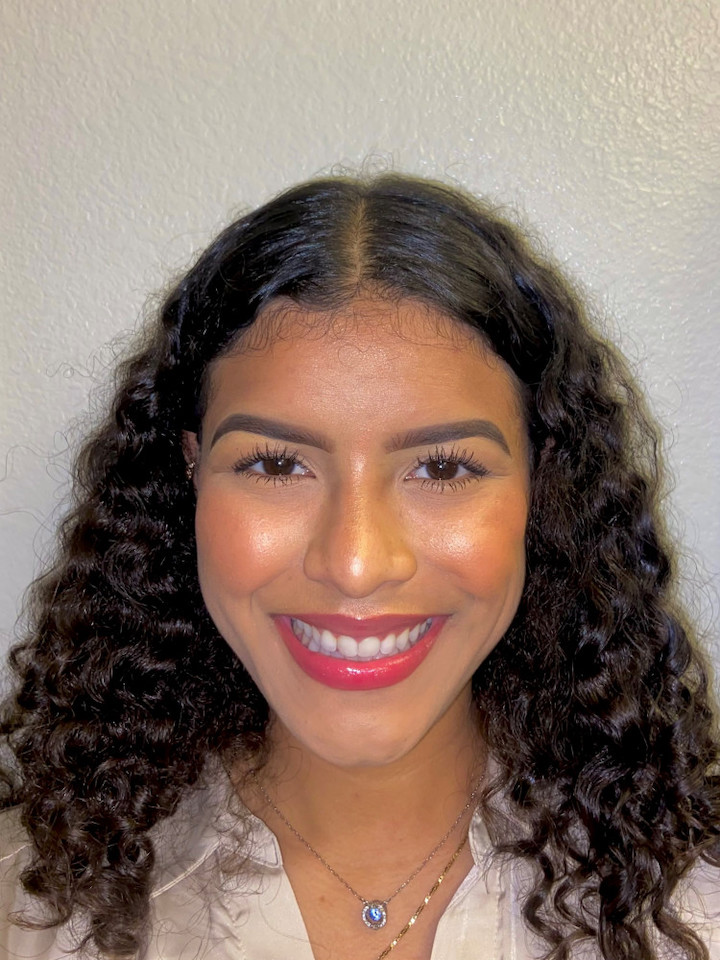Posted on March 22, 2021 by COLFA

Karla Hernández
Karla Hernández is a proud first-gen, UTSA 2020 alumna with a bachelor of arts in Medical Humanities and a minor in Biology. She speaks English, Spanish, and Portuguese, and is a CoreCHITM medical interpreter for underserved Hispanic communities in her home city, Houston, Texas. Karla is also a child language acquisition research assistant at UTSA for Professor Pablo Requena. Ultimately, she aims to become a speech pathologist, aiding multilinguals who possess language impediments.
Karla, congratulations are in order for passing the first exam in the process of earning national certification as a healthcare interpreter through CCHI, the Certification Commission for Healthcare Interpreters. Can you tell us how you got here?
Thank you, go roadrunners! I was introduced to the CCHI certification by one of my lovely professors and mentors, Dr. Melissa Wallace. I was intrigued by her biography after reading that she received a PhD in translation and interpreting studies in Spain, which I had recently traveled to for a medical fellowship abroad through a program named Atlantis. During my fellowship I found myself translating for monolingual peers and realized I didn’t know how to translate medical terminology, and that being bilingual wasn’t enough. I needed to fix that, so I enrolled in the following courses with her: Introduction to Translation and Interpreting Studies, Spanish for Health Care Professionals, and Advanced Practice for Health Care Interpreters. Any form of interpreting (medical, civil, etc.) has intricacies that require education, training, and practice, which her courses provided. Once I completed 40+ hours of academic medical interpreting, I became eligible to take the CCHI core exam. The CCHI core is a non-language-specific, multiple-choice exam focused on terminology, core values, ethics, role boundaries, and more. After passing the core exam I applied to jobs in my field and accepted an offer at an amazing hospital in Houston.
What advice do you have for other students who are interested in certification as healthcare interpreters?
My best advice to any student interested in certification as a healthcare interpreter is to enroll in TIS courses early and practice. Utilize the textbooks assigned in your TIS courses, they truly are beneficial. You can use a resource called Anki to practice and quiz yourself or YouTube scenarios (links below) to practice your interpretation skills. When you interpret, take notes. Don’t be too confident in your memory retention because one little thing forgotten could be detrimental. Don’t be afraid to kindly ask people to pause if they are expecting you to interpret too much at once; remember that you are in control of the communication flow, and you are not a robot. Also, always clarify if there is any doubt in your mind. Due to the many dialects and differences in Hispanic/Latin cultures, the intended meaning and your interpretation can be distinct, so when in doubt, clarify. Take advantage of free resources… there are so many available. Below I have listed a few that continue to aid me along this path. I hope they are useful to you too!
https://cchicertification.org/cchi-mini-glossaries/
https://www.imiaweb.org/basic/glossaries.asp
https://www.youtube.com/watch?v=_nzUvmWK6Jw
What’s next for you?
I’m currently preparing to take my CCHI oral exam, which is a language-specific exam with audio-recorded verbal responses and a written translation component. I’m also in the process of applying to another program abroad. Hopefully, in a few months, I will be away for a full school year teaching English in Spain, having a firsthand look at bilingual development. In the meantime, I will continue my time as a research assistant to prepare for graduate school. I plan on applying to a speech pathology or communication disorder master's program that offers a bilingual certification in the fall of 2022. In 2025, I will be beginning my career as a speech pathologist, I can’t wait!!
For questions about the UTSA’s offerings in translation and interpreting studies, contact Dr. Melissa Wallace at melissa.wallace@utsa.edu

